 director Cedric Kahn_600.jpg) |
| Wild Life (Vie sauvage) director Cédric Kahn Photo: Anne-Katrin Titze |
The night after the US premiere of Benoît Jacquot's 3 Hearts (3 Coeurs) starring Charlotte Gainsbourg, Chiara Mastroianni and Benoît Poelvoorde, I met up with Wild Life (Vie Sauvage) director Cédric Kahn for a conversation on his film, starring Mathieu Kassovitz and Céline Sallette. The suspense of Robert Bresson's Pickpocket mixes with Alfred Hitchcock's North By Northwest and turns into a "paranoiac world". Working with Jean-Pierre Dardenne and Luc Dardenne, choices and his role in Axelle Ropert's Miss And The Doctors came up.
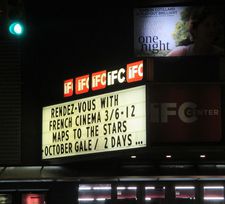 |
| 20th Anniversary of Rendez-Vous with French Cinema at the IFC Center |
Nathalie Baye, Frédéric Tellier - SK1 (L’Affaire SK1); Mélanie Laurent - Breathe (Respire); Christophe Honoré - Métamorphoses; Cédric Jimenez - The Connection (La French) with Gilles Lellouche and writer Audrey Diwan; and Abd Al Malik - May Allah Bless France (Qu’Allah Bénisse La France!) were among those who walked the red carpet the evening before at Lincoln Center's Alice Tully Hall for the 20th anniversary celebration of Rendez-Vous with French Cinema in New York.
Paco (Kassovitz) and Nora (Sallette) left society behind and chose the "wild life" with their three sons, living in a caravan in the countryside with animals, and no electricity or running water. Nora smokes nervously, you can almost smell the nicotine settling on the milky glass windows of the camper. Her long blonde dreadlocks will soon be a sign of the past, because she has had enough and wants to take her sons back to civilisation.
Anne-Katrin Titze: Let's start from the beginning. There is a lot of running and chaos at the start of Vie Sauvage for us, the spectators, to figure out. We are almost placed in the position of the children, who don't really know what's going on.
Cédric Kahn: I wanted to create that same confusion that the kids were having. What I wanted to show was prior to this moment, they had with their father and mother a very idyllic family life, a paradise. Until this day, when the mother decides to leave and all the chaos begins, which lasts for another 11 years. I wasn't really interested in the reason why she is leaving. What interested me, was the shock that it produced for the children, the consequences.
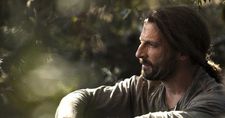 |
| Mathieu Kassovitz as Paco: "…he has constructed his whole life around getting away from reality." |
AKT: It is daring to throw the audience into their world at that moment. You give us less than a minute to adapt to what's going on. Was this always your starting point?
CK: Yes, that was the only place I could have started the story.
AKT: Hair and cutting hair is really important. For the father, it seems, getting a haircut is a crime, selling out to society.
CK: The mother changes her hair. For him, the hair represents your submission to society. By not cutting it, it's an action against it. And when the adolescents cut their hair, it's their first act of rebellion. And for the father, it's a betrayal. And also he let them grow their hair longer because people then confuse them with girls. And in the clandestine life that they were living, people were looking for a father with two boys. So if they thought it was a father with two girls, it was safer for them. Having hair like that, they also had a way of hiding.
AKT: There is a moment at a train station when the father tells one of the sons to follow a woman, a stranger, as though he belonged to her. I thought of Pickpocket meets North By Northwest, Cary Grant turning into a porter.
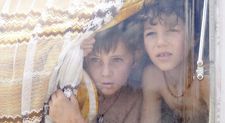 |
| David Gastou as Tsali Sofiane Neveu as Okyesa: "I think that they would choose their life from before." |
CK: The suspense. I think at that moment what I wanted to do was to have people enter into the paranoiac world the father was already in. And he has his kids enter into this paranoia with him. The latter part of the film when the children become adolescents (played by Romain Depret and Jules Ritmanic), this is their moment when they're trying to escape that paranoia to find again a contact with reality. It's almost a question of survival for the children.
AKT: They cannot live in his phantasy, in his imagined world anymore?
CK: Yes, because the world he created for his kids is a fictional world. It's a place where people live outside of the system, where they need no one, live outside legality, where they live like Indians, but it's not a real world. And the first part of reality that the father denies is the mother. He never speaks about her.
AKT: Does he believe in this "reality" that he is creating for them?
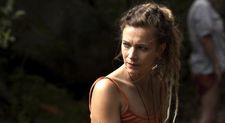 |
| Céline Sallette as Nora: "And the first part of reality that the father denies is the mother. He never speaks about her." |
CK: Yes. Up to this day he [Xavier Fortin, the inspiration for Paco] is in that world that he created. To me, it's a portrait of a paranoiac. And this is why the scene in the train station is so important because he has constructed his whole life around getting away from reality. And this is a moment where he has to confront reality, an acute paranoid crisis for him.
AKT: The two young boys are fantastic.
Their faces tell us everything we need to know. David Gastou as nine year-old Tsali and Sofiane Neveu as eight year-old Okyesa can look filthy and hateful, beautiful and strong, desperate and defiant as they reflect back to us their father's dream.
CK: I agree with you.
AKT: They have great faces and very different hair, to speak of hair again. Can you talk a bit about the casting? They make for such an interesting combination.
CK: What I was looking for was not so much the resemblance but the personality of each of the kids. But then I think it's important that we can differentiate between the two of them when we find them as older children. But for me the main difference was in character. They have very different temperaments. One is very confident, very tough and the other one is very tender.
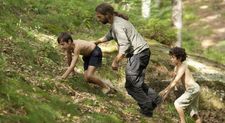 |
| Paco with Tsali and Okyesa: "…the world he created for his kids is a fictional world." |
AKT: One of the boys has a dream sequence during which he is wearing a Breton striped shirt he doesn't really own.
Okyesa dreams about his mother and Kahn shows us the dream with the little boy dressed in imagined Breton stripes (costume designer Nathalie Raoul), a sartorial reminiscence of early happy childhood days.
CK: Prison stripes!
AKT: He is the one born in Normandy. Does this shirt represent his fantasy of childhood lost?
CK: It's his pajamas. But his pajamas are a prisoner's outfit. With his father, he never had these kind of pajamas. It's a reminder of his life when he was with his mother, when he had these comfortable pajamas for himself. But the child [Neveu] was furious shooting the scene because he had to walk through the forest in his pajamas. He felt ridiculous.
AKT: The line, "what could we choose when we were seven or eight years old?" for me is at the core of your movie. How many lives in this society we live in are already decided for children at that age?
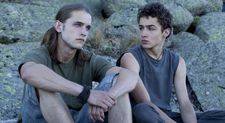 |
| Romain Depret as Tsali Jules Ritmanic as Okyesa: "They have very different temperaments. One is very confident, very tough and the other one is very tender." |
CK: Of course. For me that's really what the subject of the film is - choice. And what role does choice play in each of our lives? The film asks that question. I've had a lot of discussions in movie theatres when the film came out in France. And most of the viewers said, well, the father is awful because he doesn't give his children the choice. He imposes his way of living on them.
And I always answer to the audience that you also impose your way of life on your children. And then they go, 'yeah, that's true.' Whenever you have children you impose your way of life on them. It's very difficult to bring up children and give them the freedom of choice.
If you think you can come to an easy judgement about these people, Wild Life seems to say, think again.
In part 2, Cédric Kahn's role in Axelle Ropert's Miss And The Doctors (Tirez La Langue, Mademoiselle), working with a monkey and the Dardennes as co-producers. Wild Life producer Kristina Larson joins in on our Scandinavian discussion with my references to Nora, from Ibsen's A Doll's House and Pippi Longstocking.





















